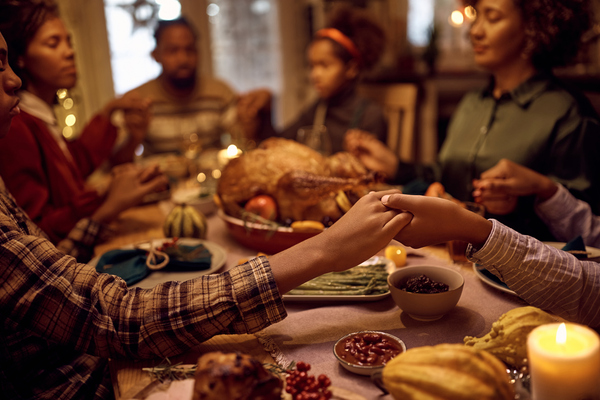By Pastor Andrews - Nov 14, 2023 #gratitude #Thanksgiving
Teaching Gratitude

The speed at which we jump from Halloween to Christmas reflects the ingratitude of our culture. One could easily get the impression we’re purposely attempting to avoid Thanksgiving altogether, which is all the more reason for you dads to impart the gift of gratitude to your children. Make no mistake, it is a gift. Research demonstrates that gratitude has positive effects such as improved physical health, better sleep, and a greater sense of well-being.
However, rest assured your kids will not develop this blessed quality on their own. We’re all born with a sinful nature, so children have a natural tendency toward selfishness. Although capable of beautiful acts of generosity and kindness, children still must be taught to be thankful. Here are a few suggestions to help you do that.
1. Share stories about gratitude.
Stories are a great resource for examples of people who demonstrated great generosity and selfless kindness and the incredible impact it can have on others. Such stories can inspire children to act in kind. Perhaps the best place to begin is with your own story. Share how someone’s else generosity and kindness had a positive impact on your life. At this time of year it’s always a good idea to tell the story of the pilgrims at Plymouth Colony and Governor Bradford’s first Thanksgiving proclamation.
2. Model generosity and gratitude.
It’s been said that some things are “better caught than taught.” Certainly gratitude is one of those. I can remember both my parents and grandparents reaching out to people in need. I especially recall one Thanksgiving where we had to wait for my uncle who heard of a poor man that lived alone and brought him to dinner with us. Modeling generosity and exhibiting gratitude is something your children will not fail to notice. It will certainly lend credibility to your instruction on the subject.
3. Discipline ingratitude.
While this may have fallen out of favor in today’s world, it remains no less important in the raising of grateful children. Fathers, insist that your kids say thank you. Refuse to tolerate an ungrateful attitude. Remember, it’s not just acts but more importantly attitudes that need correction. One of the most encouraging things I’ve observed from kids at church is how often they express their thanks, even for small things. It tells me mom and dad are doing their job well.
4. Teach the gospel.
What better way to communicate gratitude than by teaching the gospel over and over again to your children. In lovingkindness God gave his only Son to die in our places so that we might be forgiven and have eternal life. Help your kids memorize key scriptures on thanksgiving. Consider teaching them the Psalm 100, 1 Thessalonians 5:18, Philippians 4:11-12, Colossians 3:16-17, Psalm 103:2-5, and Lamentations 3:22-24 to name a few.
Many years ago as a youth pastor there was a young man in youth group that demonstrated excellent character and consistently exhibited a humble and grateful attitude. My wife and I were so impressed we asked the parents how they were able to raise such a fine Christian young man. After giving God all the credit they did offer the following, “we taught him to be grateful because gratitude never rebels.” We never forgot that and strived to follow their example. I encourage you to do the same.